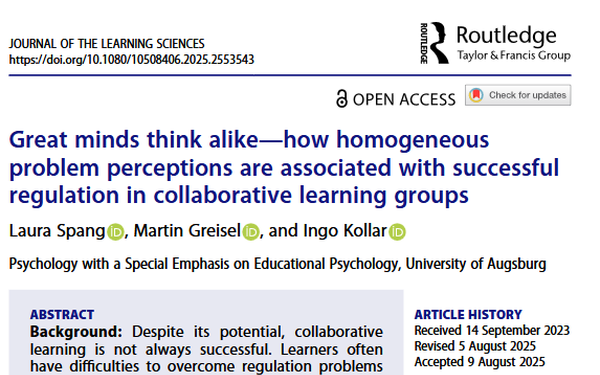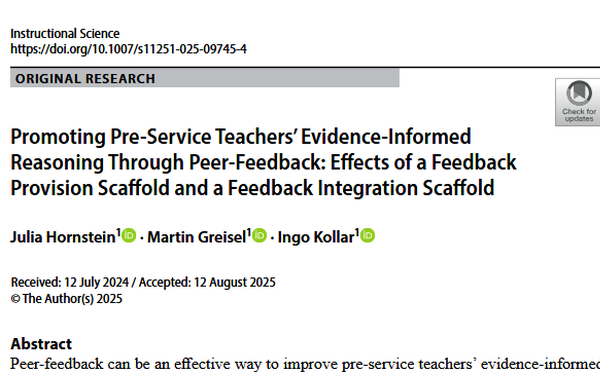News
Great minds think alike — New Article published in the Journal of the Learning Sciences
How can students successfully regulate problems during collaborative learning situations? And what role do (problem) perceptions of each group member, and their interaction play in this?
These questions were explored in a new article by Laura Spang, Martin Greisel and Ingo Kollar.
Promoting Pre-Service Teachers’ Evidence-Informed Reasoning Through Peer Feedback - New article in the journal “Instructional Science”

Successful Evidenk2 project meeting in Saarbrücken!
From May 21 to 23, 2025, Sophia Just, Martin Greisel, and Ingo Kollar spent a productive time with their collaborators in the EviDenk II project Lea Schwindt and Robin Stark at Saarland University. In addition to intensive research-related discussions, there was also time for a trip to the Saarschleife (Saar Loop). We look forward to a return visit next year!

Enhancing the Peer-Feedback Process Through Instructional Support: A Meta-Analysis - New article in the journal "Educational Psychology Review"
A warm welcome to Alina-Sheppard Bujtor!
We are very happy to welcome Alina Sheppard-Bujtor in our team. In her research, Alina will be working on the question how peer feedback can be facilitated by aid of AI and learning analytics.

Which regulatory strategy should be used for which collaborative learning problem? New article in the journal „New Ideas in Psychology“
Which regulatory strategy should be used for which collaborative learning problem? And how can I make this decision? In their article “Validating the concept of immediacy of strategy use for the regulation of collaborative learning: Results from an expert study” Laura Spang, Martin Greisel and Ingo Kollar examined the “immediacy concept”, an approach that could provide answers to these questions.

New volume on the effects of digital teaching and learning!
What are the effects of different digital technologies on students' learning and how do these technologies need to be designed in order to maximize their effects? These questions are explored in the brand-new volume “Designing Effective Digital Learning Environments”, edited by Prof. Dr. Andreas Gegenfurtner and Prof. Dr. Ingo Kollar.

A lecture entitled "Learning and Teaching 2.0: Getting off to a Successful Start with Digital Tools" was delivered at the Media Week event in Landsberg am Lech (Germany)

How Do Learners' Goals Influence Their Acceptance and Use of a Peer Feedback Tool? New article published in "Computers in Human Behavior Reports"!

KodiLL project has been extended!

New team member!
Welcome to the chair, Sophia Just!
We are very pleased to welcome Sophia Just as a new member of staff at our chair! In the future, Sophia will be strengthening the team of the project "Evidence-oriented thinking and action of teacher trainees and teachers" (EviDenk), which is funded by the German Research Foundation.

New Article Published: How Do Different Goals Affect Students’ Perceptions of Collaboration? Results of an Epistemic Network Analysis Study
Computer-supported collaborative learning offers a great potential for enhancing students' knowledge acquisition. According to Fischer and colleagues' (2013) "Script Theory of Guidance," students' goals represent an important influence on their perceptions of collaboration, which in turn affects their actions within collaborative learning situations. However, there is currently little research that examines the impact of goal-related prompts in computer-supported collaborative learning processes.
Tugce Özbek, Martin Greisel, Christina Wekerle, Andreas Gegenfurtner, and Ingo Kollar conducted an empirical study to investigate how different goal-related prompts affect students' perceptions of collaboration and their knowledge acquisition. The article was published in the special issue "Digital Collaborative Learning in General, Higher, and Business Education" of the journal "Frontiers in Psychology" and can be accessed via the following link: https://www.frontiersin.org/journals/psychology/articles/10.3389/fpsyg.2024.1410152/full

